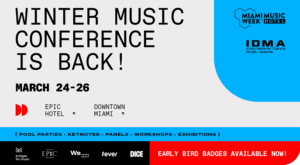Earlier this month, The Fair team headed to Manchester for the Night Time Economy Summit – a two-day event bringing together a diverse range of voices from across the industry.
The Fair hosted Stage Three on the second day of the conference, where we delved into the challenges faced by independent festivals, explored solutions, shared best practices, and advocated for policies that support their sustainability within the Night Time Economy.
We also launched our behind-the-scenes festival documentary, highlighting challenges faced across the industry, and why the festival sector deserves further support.
While the team was busy delivering the show on our stage, Production Manager Robbie O’Neill explored panel discussions across the event. Here are his opinions on the matter, and some headline moments…

1. Innovation is almost as important as government support
Panel: Navigating the Cost of Operating in a Challenging Global and UK Economy
With Mike Grieve Chairperson NTIA Scotland, Ben Newby Chairperson NTIA Wales, Holly Lester Free The Night NI, Sunil Sharpe Dublin, Ireland, Michael Rodrigues NSW 24hr Commissioner.
The panellists were asked about the main challenges currently facing the industry. Not surprisingly, the primary issue discussed was escalating costs, including business rates, energy bills, and rent.
Mike Grieve emphasised the need to acknowledge the significance of our culture to the economy gaining support from the government, particularly at the grassroots level, which he described as being in a critical condition.
Sunil Sharpe pointed out that everyone involved in the grassroots of the industry, from the ticket buyer, to the DJs and the promoters should be thinking about a “one-for-one” policy to corporate venues or stadium gigs. Every time they buy a ticket, play a set or promote a party at a huge super club or corporate sponsored festival, they should be playing at least one gig at a grassroots venue.
Ben Newby said that the hard times make us creative as well as tenacious, and that innovating to get people into venues isn’t going to be straightforward, but it never was entering the sector.
I am someone that has spent most of their adult life working in – and hanging out in – venues. I have seen the importance of innovative booking policies, incubating young promoters and doing something different. There was a cost of living crisis, and a recession in 1990, but it didn’t stop the explosion of acid house, and ultimately electronic music from a niche subculture into the dominant artistic force of the decade and beyond. It is certainly true that government inaction must end, and venues need help. But it is also the responsibility of clubs, labels, and DJs to innovate if they are seeing a slump in their audience.
2. Labour’s good intentions alone are not going to save our scene
Panel: A Manifesto for Music – How can this year’s General Election make a difference to the night-time economy?
With Jeff Smith Labour MP Withington Manchester, Luke Fletcher MS Plaid Cymru Wales, Cllr Richard Kilpatrick Lib Dem, Kate Lowes Brighter Sound
In anticipation of this year’s General Election, all eyes are on which party can deliver some critically needed life support to the independent music industry.
Kate Lowes emphasised the urgent need for increased funding for music education, citing a troubling 50% decline in A-level music enrolment over the past decade. Richard Kilpatrick underscored the critical importance of grassroots and audience support to prevent further closures of music venues, noting that 125 such venues shut their doors for the final time in 2023, and in doing so made an impassioned case for their significance as cultural heritage sites deserving of protection.
From the perspective of Labour, Jeff Smith outlined a commitment to examining and ultimately reinventing business rates, and a generally “well-intentioned” approach from the next government. True to Starmerite form, Jeff refrained from committing to any specific financial package from his party, prioritising the immediate need to address the nation’s balance sheet.
This echo of the rhetoric of austerity is unlikely to stop another 125 grassroots venues closing in 2024, and 2025. Labour’s good intentions alone are not going to save our scene.
3. In a climate of conservatism, counterculture is a phenomenon to be protected and revisited
Panel: Featured Artists Coalition Presents Where is Counterculture in 2024
With John Robb artist, Ellen Beth Abdi Artist, Jeremy Pritchard Everything Everything, OneDa Rapper/Vocalist, Graeme Park Hacienda Resident/Producer/Senior Lecturer.
Counterculture is the process whereby youth audiences deviate from the societal norms and artistic structures of previous generations, as exemplified by movements like Punk or Rave in which Graeme Park played a pivotal role.

The Haçienda, Manchester
According to Graeme, the panopticon that social media has created, where underground cultures can be surveilled continuously by corporate interests, has removed some of their transgressive energy. This sentiment was echoed by Ellen Beth Abdi, who put forward that replicating the success of other artists, and sticking to industry-recognised formulas such as TikTok or Instagram virality, is increasingly necessary for success in the music scene.
Rapper and vocalist OneDa shared her perspectives on counterculture and the music industry today. As a black, female, and gay musician, she acknowledged the potential for marginalisation that people like her face. She highlighted the underrepresentation of female producers, noting that disproportionately few of those making careers as gigging musicians in the industry are women. Because of this marginalisation, OneDa expressed that everything that can be done to address this imbalance is inherently countercultural.
While the insight shared on the panel was invaluable, I feel there is still more discussion to be had about where counterculture and the internet can work together to do disruptive work. One such example could be the proliferation of internet radio stations such as NTS, another could be where marginalised or even vilified genres such as UK Drill have relied on platforms like YouTube to reach their audience where major labels or radio stations have failed to help them to do so.
4. Independent venues and festivals can present a united front
Panel: Festivals and events: Are we united?
With Ed Gillet Author of Party Lines, Ed Taylor England Coordinator Music Venues Trust, Mike Grieve Managing Director Sub Club, Kate Osler Festival Director AEI / El Dorado.
I looped back to The Fair’s stage to see the penultimate panel of the day. The speakers focused on the intersections between independent venues and festivals like El Dorado and Sub Club, and the stadium and corporate festival circuit.
Kate Osler acknowledged the symbiosis between clubs, gig venues and festivals. Without the smaller shows in towns and cities across the UK, the talent would not exist to perform at festivals. Artists spend the majority of their gigging early careers performing in sweaty basement clubs. Without them, the UK’s music scene would lose its roots.
Mike Grieve went into some detail about the difficulties that the legendary “Subby” has faced in recent years, as well as the sheer grit it takes to get a small club off the ground and survive through three decades of non-stop turbulence, with zero support from government.
Ed Taylor provided the audience with a moving understanding of the threat that the scene faces. Hundreds of venues have closed since the pandemic. Hundreds more will close next year. Without them, the music industry in the UK will cease to be world leading – but more than that, people’s lives will be less complete. People will lose their jobs, livelihoods, safe spaces, and creative outlets.
The panellists discussed a levy on larger or corporate and stadium shows over a certain capacity, which might be solution for the problems that venues now face. Ed pointed out that none of the venues that closed last year would have closed with this support. This policy would need to be finessed to ensure independent festivals are not impacted.
5. It’s not all doom and gloom: positive initiatives are on the horizon!
Panel: UK NTE Advisors – Challenge Solutions and Approaches to UK Nightlife:
With Sacha Lord NTE Advisor Manchester, Carly Heath NTE Advisor Bristol, Alex Claridge NTE Advisor West Midlands, Tak Umezawa NTE Tokyo.
As the summit ended, the final panel convened in Manchester, bringing together NTE advisors from around the world. Sacha Lord emphasised that Greater Manchester would soon introduce night buses. He highlighted the significance of this move for workers who finish late at night.
Carly Heath and Tak Umezawa expressed their desire to see similar initiatives in their own cities. As someone that has regularly finished work long after midnight throughout my career, I cannot understate the significance that these initiatives, such as London’s night tube, have had on my wellbeing.
Among the advisors, there was a shared commitment to increasing accessibility in the industry. Sasha Lord pointed out that the Muslim community in Oldham and across the UK should have better access to alcohol-free options in venues, and that there was a need for innovation in this sense. Given that a third of 16 to 24-year-olds no longer drink, a revision of the festival and venue business model as it currently exists will likely need to be innovated within the next 10 years.
6. Reflections
VAT cuts, championed by the Five Percent for Festivals Campaign launched by AIF and The Fair, along with Michael Kill’s proposal for a sector-wide VAT reduction, dominated discussions among delegates. The Five Percent for Festivals Campaign is requesting a temporary VAT cut on festival tickets from 20% to 5%, while event organisers, nightclub proprietors, promoters, and artists are urging Members of Parliament to reduce VAT to 12.5% for all venues.

Kill, CEO of the Night Time Industries Association, stressed the importance of including alcohol in any VAT reduction, highlighting the omission of wet-led pubs, clubs, and bars from previous government support measures during the pandemic. To be effective, such VAT reductions must encompass all aspects of the sector.
It strikes me that if artist fees continue to inflate on the same trajectory which they have travelled since the collapse of the pre-streaming artist to consumer business model, they would swallow any reductions in operating costs for independent music venues and festivals that a VAT cut, or any other financial aid package from government is able to secure. This must change.
Overall, it is hard to write about NTIA’s Conference without making it clear that there is a sense of existential threat surrounding the future of the music scene in the UK. It is tremendously positive however, that so much is being done by the people behind the Night Time Industry Association, as well as supporting organisations, to bring about meaningful change through collaboration across the music and nightlife sector in the UK.
Useful links



